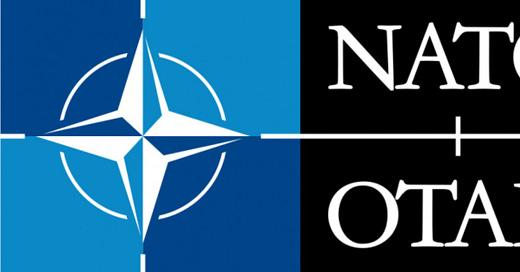You’d think scholars would welcome vigorous debate about the causes of war. After all: (1) They’re scholars and so presumably are champions of vigorous intellectual debate generally; and (2) This particular debate seems important, since understanding the causes of war might help reduce the future frequency of wars.
Makes sense in theory. But the reality seems to be that a number of notable American scholars are trying to discourage debate about the causes of the Ukraine war.
Here, for example, is Rosa Brooks, a professor at Georgetown Law School and a prominent foreign policy commentator, on how to respond to people who contend that the expansion of NATO increased the likelihood of Russia invading Ukraine: “I actually think in some ways that when people even raise that subject we should not engage in that discussion… I just wouldn’t even give it the time of day. I’d just say, ‘We have moved on, this is not relevant.’ ”
OK, that’s one approach to discouraging debate—and, actually, an admirably straightforward one. A more oblique approach came from the person she was in conversation with—Ivo Daalder, a former professor of international relations who is now president of the Chicago Council on Global Affairs.
Daalder, referring to the claim that this war could have been avoided had NATO not expanded eastward, said: “It’s a Russian talking point, let’s be very clear. It’s a talking point the Russians are still using. I’m not surprised the Russians are using it. I get pretty upset when other people, after all we have seen, continue to argue that this is all about NATO.”
I don’t think it’s too wild a conjecture to suggest that Daalder’s subtext goes something like this: If you’re an American who argues that NATO expansion led to the Ukraine War, you are aiding and abetting the enemy by reciting enemy talking points.
It’s possible Daalder wasn’t consciously trying to stigmatize people who disagree with him on the NATO issue; he doesn’t explicitly attribute pro-Russia motivation to them. But that defense isn’t available to Robert Farley, a political scientist at the University of Kentucky who, like Brooks and Daalder, is a media commentator on the war. Reacting to a piece on the Quincy Institute website that criticized America’s refusal to discuss NATO expansion with Russia before the invasion, Farley tweeted: “But this is Quincy; in general trying awfully hard to absolve Russia of the responsibility for the war it launched.”
Translation: The Quincy Institute is a den of Putin apologists, aiding and abetting the enemy.
I know all three of these people. (I had a conversation with Daalder, former US ambassador to NATO, a few years ago on The Wright Show.) They’re not bad people, and they’re not, by and large, warmongers.
That’s what’s disconcerting: It isn’t just hard core militarists who have adapted to wartime by adopting an illiberal frame of mind. In all major sectors of the Blob—neocon, very hawkish liberal internationalist, mildly hawkish liberal internationalist—you can find people who are trying to marginalize dissent from the party line. The party line being that if your assessment of the causes of this war is much more nuanced than “Putin is a bad man,” you’re dangerously misguided.
I don’t want to overdramatize this. I realize that dissenting from the Blob consensus is way less uncomfortable than, say, being a dissenter in Moscow. And I’m resilient enough to withstand the idiotic blowback I get from Twitter hacks when I bring up the NATO expansion question. Still, shouldn’t people of the stature and accomplishment of Brooks, Daalder, and Farley be more liberal-minded than idiotic Twitter hacks?
Actually, no! What I mean is: The problem here isn’t idiocy; it’s human nature. Brooks, Daalder, and Farley are classic examples of our species, for better or worse. (Plot spoiler: worse.)
The way human beings naturally think about questions of blame and causality makes it hard to have open and honest debates about why wars happen. If you argue that things done by one side contributed to the outbreak of war, it’s only natural for people to think that your argument, if accepted, would shift some measure of blame toward that side from the other side. And if the side you seem to be shifting blame toward is their side, they’ll naturally freak out, since robust support for their side depends on the belief that the other side is to blame for the war.
Rosa Brooks is explicit about this—about wanting to discourage arguments about causality for fear of their impact on arguments about blame. “I almost feel like engaging in that debate [about NATO expansion] somehow implies that if only somebody could prove that NATO expansion was indeed what triggered this for Putin, and he was right to feel threatened, that therefore [his invasion of Ukraine] is all OK.” And, she says, “It’s not OK.”
I agree: Invading Ukraine was not OK. And I have good news for Brooks: There is a way of thinking about this that allows us to have an open and honest discussion about the causes of the Ukraine war without fear of letting Putin off the hook. Ironic as it may sound, there is a way to insulate the question of blame from questions about causality.
But before I get to this magic solution, I want to explain why I think it’s so important to have a vigorous debate about the causes of this war—and to have it right now.
Namely: I think the US foreign policy mistakes (certainly including NATO expansion) that made this war more likely are the kinds of mistakes the US chronically makes—and that these kinds of mistakes are at this very moment destabilizing parts of the world nowhere near Ukraine. The sooner we grasp that, the better.
To flesh this out a bit:



